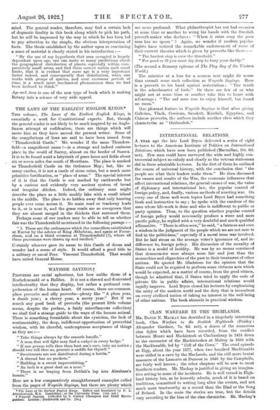WAYSIDE SAYLNGS.t PROVERBS are racial aphorisms, but how unlike those
of a Rochefoucauld or a Halifax. It is not a shrewd and desiccated intellectuality that they display, but rather a profound com- prehension of the human heart. Of course, there are common- place proverbs and silly proverbs—plenty like "A plum year, a dumb year ; a cherry year, a merry year." But if we search any good book of proverbs (the present little volume seems, despite the preface, a fairly miscellaneous collection) we shall find a strange guide to the ways of the human animal. There is something formidable about the cynicism, the lack of sentimentality, the deep, indifferent opportunism of proverbial wisdom, with its cheerful, contemptuous acceptance of things as they are :— "Take things always by the smooth handle."
" A 'man that will fight may find a cudgel in every hedge."
"If one person tells thee thou haat ass's ears, take no notice ; should two tell thee so, procure a saddle for thyself."
Sweetmeats are not distributed during a battle."
"A shroud has no pockets."
"Building is a sweet impoverishing."
"An inch is a great deal on a nose."
"There is no leaping from Delilah's lap into Abraham's bosom."
Here are a few comparatively straightforward examples culled from the pages of Wayside Sayings, but there are plenty which
• The Laws of the Earliest English Xing.. Edited and translated by N. L. Attenborough, MA. Cambridge : at the University Press. [lbs, net.] t Waystele Sayings. Collected by S. Gurney Champion and Ethel Mavro- gordato. London: Duckworth and Co. tbs.]
are more profound. What philanthropist has not had occasion at some time or another to wring his hands with the Swedish proverb-maker who declares : "When it rains soup the poor man has no spoon " ? Again, we wonder if modern psycho- logists have noticed the remarkable endorsement of some of their current theories which is given by proverbs like these :— "The hardest step is over the threshold."
"For good or ill you must dig deep to bury your daddy."
(The second a Romany epitome of The Play Boy of the Western World.) The minister at a loss for a, sermon text might do worse than consult some such collection as Wayside Sayings. Here is a proverb to his hand against materialism : "The result is the schoolmaster of fools." Or there are few of us who might not at seine time or another take this to heart with advantage : "The sad man rose to enjoy himself, but found no room."
One pleasant feature in Wayside Sayinp is that after giving Galician, Vlach, Corsican, Sanskrit, Kurdish, Egyptian, and Chinese proverbs, the authors include another class which they characterize as "Outlandish."


































 Previous page
Previous page